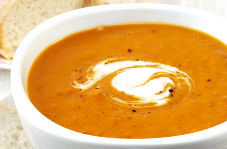9 Protein Rich Options That Every Vegetarian Should Know About
 0
0
 2015-12-13
2015-12-13

Image Source: Spirit Science And Metaphysics
Protein is a very vital part of our daily diet, it enhances hair growth and strengthens them. In fact, our hair and nails are made of protein. Hence the fragile nails and frizzy hair tell a lot about you, maybe you lack protein. In addition to this, protein repairs and builds tissues, it builds bones and muscles in the body thus helping to manage lean weight. Yes, we get it that proteins are very important for a healthy lifestyle, but how to consume them? Mostly, non-vegetarian food is protein rich. Does that mean that vegetarians have no rights to be body builders and stay healthy? No, nature is not that cruel, it has made really good and tasty protein rich options for vegetarians too.
1. Quinoa
Protein content (per 100 grams): 4.4 g
Quinoa looks like couscous but is way more nutritious. It is a grain crop that is cultivated for its edible seeds. It is also rich in amino acids and dietary fibre thus making it a dieter’s favorite.
Protein content (per 100 grams): Sesame seeds (whole roasted and toasted) 16.96 g, poppy seeds 21.22 g, sunflower seeds 20.78 g, pumpkin seeds 29.84 g
Seeds contain nutritional value and regular consumption helps in overall growth and development of our body. But did you know that seeds like sesame, poppy, and sunflower seeds, pumpkin seeds are protein rich are a very good vegetarian option to increase your protein intake.
- Nuts
Protein content (100 grams): Pistachio 20 g, cashew nuts 18 g, almonds 21 g, walnuts 15 g
Nuts are rich in protein. They also provide quick and instant energy, but since they contain fats, it is advisable to limit quantity we consume.
-
Soy And Tofu
Protein content (per 100 grams): soybean 36.49 g, tofu 8 g
Soy contains one of the highest sources of vegetarian protein thus it a considered the best meat alternative for a vegetarian high protein diet. Soy milk and tofu are the most commonly consumed soy products, but if you love beans, Himalayan Black soy, is a great protein option.
- Beans
Protein content (per 100 grams): Kidney beans 7.2 g, 21.25 g
Beans come in a large variety, red kidney beans, cannellini beans, black beans etc. Despite the name and color one thing that is common amongst all the beans is that they are very rich in protein. They can be bought dried or canned and can be consumed in various ways.
6. Peanut
Protein content (per 100 grams): 25 g
Peanut also known as groundnut is a protein rich legume. It is also classified as an oil crop, as it contains a high amount of oil. Besides, it is a great source of polyunsaturated and monounsaturated fats, vitamins and minerals thus it is very beneficial for good health. Various peanut products like peanut oil, peanut flour, boiled peanuts, dry roasted and peanut butter are available in the market. Need more reasons to enjoy peanut butter?
- Pulses
Protein content (per 100 grams): Toor/Arhar 21.7 g, Mung 23.86 g, Masoor 26, Chana 25, Urad 25.21
Pulses or daal as we know them more commonly are whole beans split and polished. However polishing washes away the nutrients in the pulses, hence it is advisable to consume unpolished and organic pulses.
8. Chia Seeds
Protein content (per 100 grams): 16. 54 g
Chia seeds are versatile, adding them to any dish will add a new dimension to that preparation. In addition to being rich in protein they are also rich in dietary fiber, omega-3, and omega-6 fatty acids, this perhaps is the reason why they are included in the weight loss diet. They substitute eggs in baking.
- Chickpeas
Protein content (per 100 grams): 8.86 g
Chickpeas are legumes commonly known as gram or Bengal gram. They are also called garbanzo beans. They can be consumed in many forms like boiling and making a salad out of them, toasting and crisping them up, making a paste out of it and eating it as hummus, is one of my personal favorites. In India, chickpea flour is very commonly used in the kitchen, it is more commonly known as besan. If you love daal and pulses, try including chana daal in your diet.

Who said that vegetarians can’t have a protein rich diet?
Nutritional value details from Wikipedia.

 Joybynature.com Team
Joybynature.com Team



